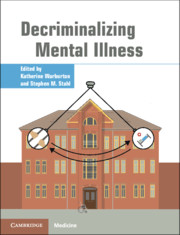Book contents
- Decriminalizing Mental Illness
- Decriminalizing Mental Illness
- Copyright page
- Contents
- Contributors
- Part I Introduction/Description of the Problem
- Chapter 1 Balancing the Pendulum: Rethinking the Role of Institutionalization in the Treatment of Serious Mental Illness
- Chapter 2 Deinstitutionalization and Other Factors in the Criminalization of Persons with Serious Mental Illness and How it is Being Addressed
- Chapter 3 A Brief History of the Criminalization of Mental Illness
- Chapter 4 A Social History of Psychotic Illness
- Chapter 5 Forensic Patients in State Psychiatric Hospitals: 1999–2016
- Chapter 6 A Survey of National Trends in Psychiatric Patients Found Incompetent to Stand Trial: Reasons for the Reinstitutionalization of People with Serious Mental Illness in the United States
- Chapter 7 Forensic Psychiatry and Mental Health in Australia: An Overview
- Chapter 8 Community Forensic Psychiatric Services in England and Wales
- Chapter 9 A Longitudinal Description of Incompetent to Stand Trial Admissions to a State Hospital
- Part II Solutions
- Part III Psychopharmacological Treatment Considerations
- Part IV Nonpsychopharmacological Treatment Considerations
- Part V Criminal Justice and Social Considerations
- Index
- References
Chapter 9 - A Longitudinal Description of Incompetent to Stand Trial Admissions to a State Hospital
from Part I - Introduction/Description of the Problem
Published online by Cambridge University Press: 19 October 2021
- Decriminalizing Mental Illness
- Decriminalizing Mental Illness
- Copyright page
- Contents
- Contributors
- Part I Introduction/Description of the Problem
- Chapter 1 Balancing the Pendulum: Rethinking the Role of Institutionalization in the Treatment of Serious Mental Illness
- Chapter 2 Deinstitutionalization and Other Factors in the Criminalization of Persons with Serious Mental Illness and How it is Being Addressed
- Chapter 3 A Brief History of the Criminalization of Mental Illness
- Chapter 4 A Social History of Psychotic Illness
- Chapter 5 Forensic Patients in State Psychiatric Hospitals: 1999–2016
- Chapter 6 A Survey of National Trends in Psychiatric Patients Found Incompetent to Stand Trial: Reasons for the Reinstitutionalization of People with Serious Mental Illness in the United States
- Chapter 7 Forensic Psychiatry and Mental Health in Australia: An Overview
- Chapter 8 Community Forensic Psychiatric Services in England and Wales
- Chapter 9 A Longitudinal Description of Incompetent to Stand Trial Admissions to a State Hospital
- Part II Solutions
- Part III Psychopharmacological Treatment Considerations
- Part IV Nonpsychopharmacological Treatment Considerations
- Part V Criminal Justice and Social Considerations
- Index
- References
Summary
According to the US Supreme Court, all individuals charged with a crime must be competent to stand trial (CST). As defined in Dusky v. US, competency requires that defendants have the ability to consult with their attorney with a reasonable degree of rationality and possess a rational as well as factual understanding of the legal proceedings. The precise number of CST evaluations conducted each year is unknown. The oft-reported figure of 60,000 provided by Bonnie and Grisso is an estimate based on the number of felony indictments coupled with the estimated percentage of referrals for competency evaluations made by the courts in the 1990s. Later work has suggested a much higher number.
- Type
- Chapter
- Information
- Decriminalizing Mental Illness , pp. 79 - 96Publisher: Cambridge University PressPrint publication year: 2021

